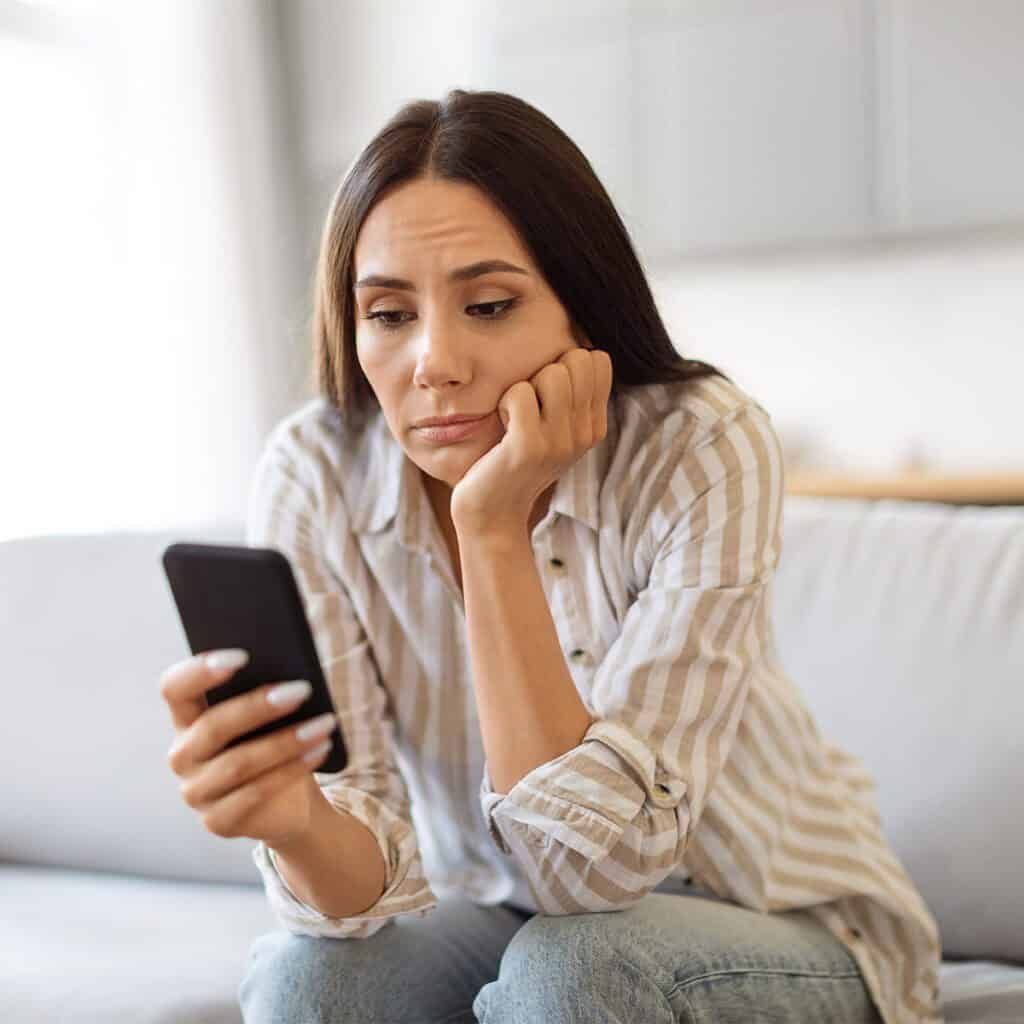Since its inception, social media and mental health have had a complicated history. While initially created as a fun, engaging pastime, many negative effects of social media have developed for the users that partake in it.
However, that’s not to say there aren’t positive aspects of social media such as the following:
- Connection – Now, we are more connected than ever to friends and family who don’t live in the same city as us. Social media allows you to stay in touch with college friends that have moved away, family members back in your hometown, and more.
- Information – While not everything you read online is true, it’s hard to refute that social media is a quick and efficient way to spread information to a large group of people. Breaking news, announcements, and trends can easily be shared around the world.
- Community – Similar to connection, social media can give you a sense of community with those in your geographical area (i.e. on a college campus) or with those with similar interests (i.e. book bloggers). In some ways, it allows users to realize they are not alone.

Despite the good, there are perhaps even more negative effects of social media, particularly in regards to the relationship between social media and mental health.
Negative Effects of Social Media
While not an exhaustive list, social media can:
- Increase feelings of depression
- Increase symptoms of anxiety
- Decrease self-esteem
- Contribute to feelings of isolation
- Disrupt proper sleep
- Lead to cyberbullying
With so many people across the world using social media, it’s important to know the potential negative effects that it can cause. By staying aware of the risks, users can intentionally use social media in a healthy way.
Understanding Social Media’s Impact
Social media has certainly taken the world by storm. With countless social media platforms to choose from, people of every age group are online in some way. Adolescents in particular are consistently using social media and are the most prone to its negative effects.
According to the American Academy of Child and Adolescent Psychiatry, 90% of teenagers (between the ages of 13-17) have used social media. Of that, 51% of teenagers are visiting a social media platform at least once a day.
It may seem easy to brush off the potential side effects of social media usage on user’s mental health; however, research is clear on the impact that social media has.
According to U.S. Surgeon General’s Advisory, a study conducted on teenagers between the ages of 12-15 found that adolescents who spent at least three hours per day on social media doubled their risk of mental health problems including experiencing symptoms of depression and anxiety.
Limiting social media usage has been shown to decrease symptoms of depression and anxiety in both adolescents and adults.
Common Social Media and Mental Health Concerns
In addition to the negative effects of social media, there are a few specific mental health concerns that affect many users:
Social Media Anxiety
This is exactly how it sounds: anxiety that centers around social media. In addition to common symptoms of anxiety, social media anxiety can increase your dependency on your phone, lower your self-esteem, and preoccupy all your thoughts with social media and what you might be missing.
Social Media Addiction
While it may sound strange, social media addiction can occur for many users. A user may experience consistent, strong compulsions to log online, spend excessive time periods scrolling, experience symptoms of withdrawal, and other unhealthy symptoms.
Unhealthy Comparisons
Often, social media encourages users to compare themselves to others in an unhealthy way.

Users may compare their body type, looks, and overall life to influencers, family, and friends on social media. This can lead to self-esteem issues and unhappiness with their current life.
What is FOMO?
Also known as the ‘fear of missing out,’ FOMO occurs when a user sees others posting vacations, academic/work achievements, big life changes, and more and it makes the user feel like they are left out or missing important things in their own life. This can also contribute to feelings of anxiety and depression.
Managing Your Social Media Experience
There are ways to partake in social media without it having a significant impact on your mental health. With a few changes and some healthy boundaries, your social media experience can be managed to allow you to experience the positive side of being online while reducing the negative effects of social media.
Social Media Detox
One way to manage your social media experience is to participate in a social media detox. Taking scheduled breaks from social media has been shown to decrease stress, improve self-esteem, and increase emotional resilience.

There are a few different ways to detox:
- Set time limits – If you don’t want to commit to a full social media detox, you can set daily screen limits for each social media platform on your smartphone. Start by setting an initial time limit and slowly decreasing it each week if you’re seeking to lessen your time spent on social media.
- Schedule downtime – In some instances, it may be best to limit your time on social media at specific times of the day. For instance, if you’re having trouble sleeping, set yourself a ‘digital curfew’ and stop using screens at least an hour before going to bed.
- Schedule social media time – On the flip side, for some, it may be easier to schedule time when it is okay to get on social media. You may allow yourself 30 minutes of screen time on your lunch break and 15 more minutes after dinner. This can limit the amount of times you check social media throughout the day while still allowing you to have some scroll time.
- Delete the apps – One of the easiest ways to have a social media detox is by getting rid of the apps altogether. Even if you choose to do this just for a limited time period, it can reduce your time spent scrolling and help lessen your addiction.
Find Balance and Make Healthy Habits
At the end of the day, the relationship between social media and mental health can be improved by finding balance and making good habits. For some, the connection and community that social media provides is worth the hassle.
Here, we’ll discuss a few ways that you can continue to use social media without overusing it or experiencing negative effects:
- Turn off push notifications – Once you’ve opened a social media app, it’s likely that you’ll continue scrolling for minutes on end. One way to avoid this is by turning off app notifications. This will limit the amount of times you check your account per day.
- Set time limits – As we discussed earlier, time limits can help lessen the amount of time you spend on social media. Whether you set this limit on your smartphone or make an intentional boundary, this can help you maintain a healthy balance.
- Delete apps from your phone – Access to social media on your phone can contribute to excess scrolling time. By deleting the apps from your phone and only checking social media on your laptop, you can limit the amount of access that you have.
- Create “no-phone zones” – If social media is disrupting your sleep or other areas of your life, designated zones where phones are not allowed, like your bedroom.
Limiting the negative effects of social media can also be done by creating healthy habits. Here, we’ll share our tips for a few habits that you can create for a healthier online presence:
- Only follow accounts that give you joy – You shouldn’t feel sad when scrolling through social media. If accounts make you feel depressed, give you FOMO, or otherwise upset you, mute, unfollow, or block those accounts.
- Be intentional when scrolling – It’s so easy to harmlessly check your account and then wind up scrolling for an hour. As you use social media, be intentional of what you are hearing and seeing. This can help eliminate mindless usage.
- Live in the moment, not online – Not everything is about social media. While you go out, don’t be consumed with getting the perfect shot for your Instagram story. While you’re hanging with a friend, ask intentional questions rather than sitting and scrolling in silence.
- Recognize how you feel – Try to recognize how you feel during and after using social media. If you begin to notice feelings of anxiety, depression, or low self-esteem, take a break from social media using the detox tips we discussed.
There doesn’t have to be an unhealthy relationship between social media and mental health. Don’t let social media control your life. While there are several positives to being online, don’t let the negative effects of social media take a toll on you. Learn to recognize these effects and maintain healthy habits while using social media to avoid them.
